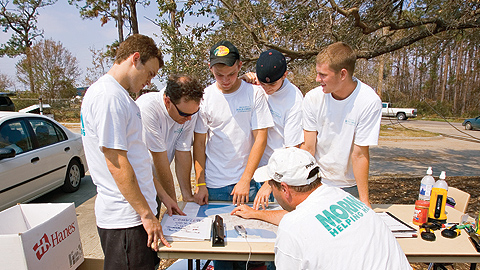
After a major disaster, there may be many people who volunteer to help in the relief efforts. Local Church leaders should determine how to respond to these offers.
Local Partner or Community Requests
Managing Offers of Help from Others
Church Public Affairs and Emergency Response
Local Partner or Community Requests
Often local partners and community resources may desire to partner with the Church in disaster response and recovery efforts. Refer to the Humanitarian Project Request Form for these projects.
Managing Offers of Help from Others
Local offers:
- Before considering local offers of donated labor, leaders should first organize the Church cleanup effort.
- After determining immediate needs, local Church leaders may encourage donations by local members of needed items such as food, blankets, and so on. These items may be given to community organizations or to the Church if local leaders have determined a way to store and distribute these goods.
Offers from outside the disaster area:
Church leaders and other members from outside the disaster area may want to donate money, purchasing cards, clothing, blankets, food, and other items. Other people will want to help with the cleanup. The management of volunteer service and donations can be challenging, as conditions within the disaster zone are often chaotic. These generous offers can put a strain on local resources, require warehousing that isn’t available, create security concerns, and siphon away needed food, water, and shelter that are in short supply for victims of the disasters. Leaders should comply with the following guidelines when assessing offers of help after disasters:
- All cash donations to the Church or its members should be made through fast offering or humanitarian funds.
- General solicitations for donations or relief supplies, requests for volunteer assistance, and other types of help directed to Church members or the public should not be made without the approval of the assigned Area Seventy or other assigned leader.
- Church leaders and other members from outside the disaster area should be encouraged to:
- Pray for those affected by the disaster.
- Increase fast-offering donations.
- Donate to the Church humanitarian fund (ldsphilanthropies.org).
- Support other reputable relief agencies.
Offers from spontaneous unaffiliated volunteers:
All volunteers involved in Church response efforts, including those of other faiths, are to uphold Church standards. Priesthood leaders should recognize the risk of using spontaneous unaffiliated volunteers who appear on site. These are volunteers who offer to assist in cleanup activities but who are not members of our faith and are not affiliated with other organizations.
Priesthood leaders may choose to provide close supervision for these volunteers or refer them to other volunteer agencies.
Offers of professional medical assistance:
- If the assigned Area Seventy feels that professional medical assistance from outside the disaster area is needed, the area welfare manager can arrange for the selection of approved medical professionals and the delivery of appropriate medical supplies.
- Many well-intentioned medical personnel or organizations may offer assistance during major disaster situations. If a priesthood leader is contacted by medical personnel or organizations not officially sponsored by the Church, the leader should decline the offer.
Because of laws and liability issues, all medical personnel must pass through a credentialing process to verify that they are currently licensed and/or certified to perform medical services in the state where they desire to serve. The organization and personnel must have their own liability coverage for medical practice. They should come to the disaster site completely self-contained and able to perform their services without requiring Church assistance or a location to practice (such as a meetinghouse).
If an organization’s activities are approved by a priesthood leader, or if it is allowed to use a Church meetinghouse, others could claim that the Church sponsored or condoned their service, and the Church could be held responsible for liability claims.
Church Public Affairs and Emergency Response
The stake president directs public affairs in the stake (see Handbook 1: Stake Presidents and Bishops, 1.1.8). Church public affairs representatives seek opportunities to present the Church in a positive light with key decision makers and the media. VOAD representatives coordinate emergency planning and response with government agencies and non-governmental organizations. They should work together in preparing for and responding to emergencies.
As requested by local Church leaders, Church headquarters approves any resources (materials or cash) for use by government or non-governmental organizations. Local priesthood leaders approve Church volunteer labor for these organizations. Neither VOAD nor public affairs representatives should make commitments to these organizations without approval.